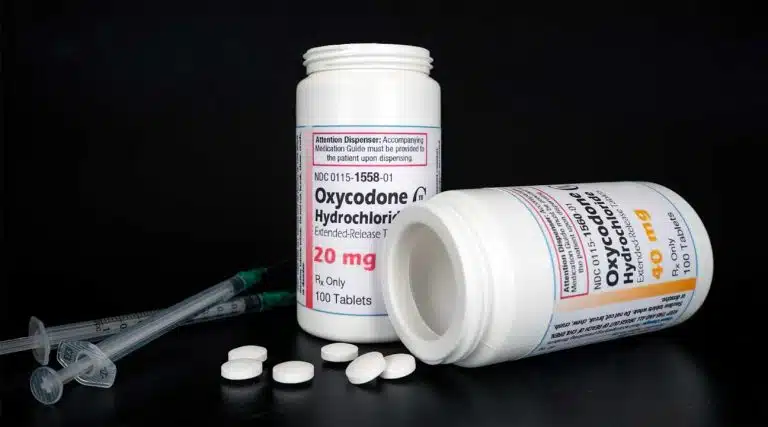Injecting Oxycodone | Health Risks & Side Effects

Oxycodone is the primary ingredient in a number of prescription pain-relief medications prescribed to individuals suffering moderate to severe pain, often over long periods of time and in combination with other drugs like acetaminophen.
These painkillers include name-brand products like OxyContin, Percocet, and Roxicodone.
Oxycodone is also an opioid or semi-synthetic opiate similar to heroin, hydrocodone, codeine, methadone, and others, and in the United States is classified as a Schedule II drug, indicating a high potential for dependence and abuse.
Health Risks Of Oxycodone Injection
Oxycodone can be taken in pills, capsules, or liquid solutions. However, when used as an illicit drug, some choose to inject the compound into their bodies directly as this vector provides a more immediate and heightened effect.
However, this method of drug abuse poses serious health risks.
Scarring
Any form of injection drug abuse is going to break up the skin and cause telltale scarring at injection sites. These scars are permanent, and are not guaranteed to fade over time.
Skin Infections
Using non-sterilized needles or neglecting to sterilize the skin before injection can expose the body to dangerous bacterial infections, leading to serious skin infections, abscesses, cellulitis, and other skin conditions.
Cardiovascular Infections
Drug use using non-sterile needles or skin can also introduce bacteria to the bloodstream. This can lead to infections of several organs including the endocardium (the interior lining of your heart), heart valves, and lungs.
These infections are potentially fatal causes of heart failure and are cause for serious medical intervention.
Infectious Disease Transmission
Sharing needles is a common vector for certain serious infections including HIV and Hepatitis C.
HIV, or human immunodeficiency virus, is a virus that attacks immune cells, cells that help the body fight off other infections.
Hepatitis C is a virus that causes damage to the liver, damage that can become serious over time. Chronic Hepatitis C infection can be cured with specialty medications taken daily for two to six months.
Unfortunately, a Hepatitis C infection is usually silent for years after a person comes down with it as the virus flies under the radar until doing enough damage to the liver that signs and symptoms of liver disease appear.
Damage To Blood Vessels & Limbs
Because oxycodone injection requires pills to be crushed and prepared before injection, the process ends up introducing solid particles into the bloodstream.
These particles (and the trauma from repeated injections) can do severe damage to the circulatory system by starting blood clots, collapsing blood vessels, and triggering severe swelling in the arms, feet, and legs.
This damage can become so severe as to cause necrosis/death of arm or leg tissue. If this happens, the impacted limb will need to be swiftly amputated to save the individual’s life.
Overdose
Prescription painkillers are designed to provide pain relief over an extended period of time. By shooting up the drug, rather than taking it orally, an individual can experience the full effect of the drug all at once instead of over a longer period.
This provides a much more intense high, while also drastically increasing the risk of overdose and death.
Overdose symptoms may include:
- uncontrollable sweating
- muscle limpness or weakness
- wide or pinpoint pupils
- bluish coloration to lips or fingers
- difficulty breathing
- loss of consciousness or coma
- seizures
- painful, racing heartbeat
While treatable with naloxone, overdosing is a severe medical event that requires immediate emergency health care.
Dependence & Addiction
Drug users who abuse oxycodone, especially through injection but also through snorting and other forms of non-prescriptive abuse, become physically and mentally dependent on the drug.
Symptoms of oxycodone addiction include:
- tolerance, in which you require increasing doses of the painkiller to achieve the same high
- physical dependence, or when you suffer intense withdrawal symptoms when trying to quit the drug
- emotional dependence, or when you withdraw from family, friends, and passions to pursue the high
Without treatment, addiction can result in increasingly risky and self-destructive behavior as mental health and wellbeing deteriorate
Oxycodone Addiction Treatment Options
Due to its prevalence as a prescription drug and short-term painkiller popular for medical use, it’s common to believe that overcoming oxycodone dependence and addiction is easy.
But, especially for long term users and abusers of prescription opioids and pain relievers, this is rarely the case.
Dealing with oxycodone addiction can be just as difficult as recovering from an addiction to any other opioid or illicit drug, and working with a qualified substance abuse treatment center can make all the difference.
Available on an inpatient or outpatient basis, proper detox and addiction treatment empower individuals to deal with their addiction safely while addressing vital underlying issues and conditions for lasting harm reduction and recovery.
To learn about our treatment programs, please connect with us today.
Written by Ark Behavioral Health Editorial Team
©2024 Ark National Holdings, LLC. | All Rights Reserved.
This page does not provide medical advice.
U.S. Drug Enforcement Administration (DEA) - Oxycodone (Trade Names: Tylox®, Percodan®, OxyContin®)
MayoClinic - Hepatitis C - Symptoms and causes
MayoClinic - HIV/AIDS - Symptoms and causes

Questions About Treatment?
Ark Behavioral Health offers 100% confidential substance abuse assessment and treatment placement tailored to your individual needs. Achieve long-term recovery.
100% confidential. We respect your privacy.
Prefer Texting?
Our friendly support team is here to chat 24/7. Opt out any time.







 Learn More
Learn More








